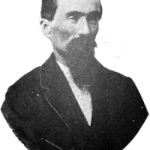 March 11—At ten o’clock this morning we heard that the Yankees were advancing in force. We received orders to move toward Winchester, to go within one mile of town and await further orders. Immediately after we arrived within a mile of town we were ordered to return down the pike, to check the enemy’s advance guard. We went about two miles below town and put one gun [the howitzer] in position, and awaited the approach of the Yanks. Our first position was nearly two miles in advance of Jackson’s army, which was then near Winchester.
March 11—At ten o’clock this morning we heard that the Yankees were advancing in force. We received orders to move toward Winchester, to go within one mile of town and await further orders. Immediately after we arrived within a mile of town we were ordered to return down the pike, to check the enemy’s advance guard. We went about two miles below town and put one gun [the howitzer] in position, and awaited the approach of the Yanks. Our first position was nearly two miles in advance of Jackson’s army, which was then near Winchester.
We did not have to wait long before we saw the enemy, an immense force steadily advancing on the Martinsburg road, and a column of infantry with waving banners winding along the hillsides west of the pike, like some huge shiny snake in a coat of mail, reflecting the bright afternoon sunlight that flashed with shattered splendor from thousands of glittering muskets and burnished trappings. The magnificent splendor of the scene was truly fascinating, yet danger lurked in the approaching panoramic sheen.
The cavalry was in front in solid column, which once or twice threw out bodies of skirmishers that scoured the woods and fields on their left. The infantry marched in splendid order in columns of four, close in rear of the cavalry. Now and then I saw little bunches of white smoke rising from their line of sharpshooters as they sped their bullets at some daring Rebel cavalrymen that ventured too near the coming warish anaconda.
They advanced cautiously and slowly. As soon as their cavalry came within range of our gun we fired two shell at them, then fell back to the fair ground, taking a position which we held till after dark. It was nearly sunset when we arrived at the fair ground, and just as the sun was sinking behind the hills Jackson’s men began to move in various maneuvers, marching and counter-marching around the fair ground and through the fields at the north end of Winchester.
When the twilight began to grow into dusk I saw some of the infantry regiments march into the breastworks on the hill west of town. We remained at the fair ground with our guns in battery ready for action at a moment’s warning until some time after dark. Then, all being quiet in our front, we retired slowly through the silent streets that were soon to echo the martial tread of the invaders. We fell back to Milltown Mills on the Valley pike, and remained until midnight, then retired to Bartonsville. From all appearances Winchester is evacuated, and will be occupied by the enemy to-morrow morning.
Jackson’s forces are retreating up the Valley. Their camp-fires are blazing all along the pike south of Kernstown by Bartonsville and toward Newtown.
It is now nearly two hours after midnight, and the air is cold and chilly. A few moments ago I saw General Jackson bending over a dying camp-fire by the roadside warming his hands. After standing there a while apparently in deep meditation, and as silent as the glow that was playing over the embers, he drew his faded cap closer over his brow, mounted his horse, and rode slowly away toward Newtown.
Here at Bartonsville, which is six miles from Winchester, we, at two o’clock in the morning, wrapped our blankets around us, weary and fatigued, and dropped on the bosom of Mother Earth to snatch a few hours of balmy sleep.


